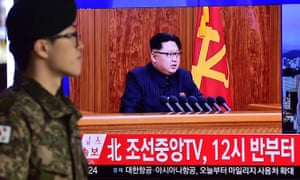North Korean leader uses regular rhetoric against ‘invasive outsiders’, but stays away from past nuclear weapon and missile threats

North Korean leader Kim Jong-un used his New Year’s speech on Friday to say he was ready for war if provoked by “invasive” outsiders, but stayed away from past threats regarding nuclear weapons and the country’s long-range missile ambitions.
His comments stuck to the well-worn propaganda designed to lift his image for the elite residents of one of the world’s poorest, most closed countries, and could be read as an attempt to keep ties with rivals Washington and Seoul from getting worse so he can try to turn around a miserable economy and further solidify his leadership.
“We will continue to work patiently to achieve peace on the Korean Peninsula and regional stability. But if invasive outsiders and provocateurs touch us even slightly, we will not be forgiving in the least and sternly answer with a merciless, holy war of justice,” said Kim.
While largely a repeat of the kind of propaganda that appears daily in state-controlled media, Kim’s words on state TV will be pored over by North Koreaanalysts for hints about the country’s intentions for the coming year.
Some observers had predicted that Kim would avoid overly provocative statements because the county wants to improve relations with South Korea and also China, its most important economic and strategic ally. Ties between North Korea and China have been cool since Kim took power in 2011, but seemed to improve when a senior Chinese official attended a high-profile military parade in Pyongyang in October.
Kim didn’t directly offer dialogue to Seoul and Washington, but said he was open to talks with anyone truly interested in “reconciliation and peace” on the Korean Peninsula. He vowed to improve North Korea’s struggling economy, and also called for the military to advance its technologies to develop more “diversified attack means”.
Analysts say it is likely Kim wants a push for tangible diplomatic and economic achievements before a convention of the ruling Workers’ party in May, the party’s first since 1980, when he is widely expected to announce major state policies and shake up the country’s political elite to further consolidate his power.
The rival Koreas have been showing mixed progress in reconciliation efforts after they stepped away from a military standoff in August, which started when land mine explosions that Seoul blamed on Pyongyang maimed two South Korean soldiers. The countries ended rare high-level talks in December with no breakthroughs.
In familiar language, Kim in his speech criticised South Korea for continuing to be influenced by “foreign powers”, a reference to its alliance with Washington.
